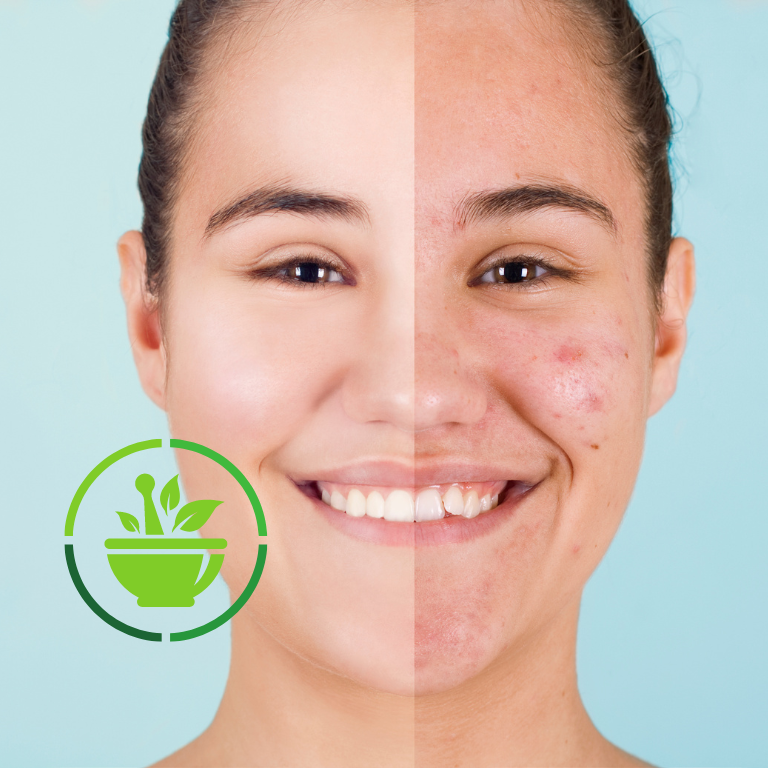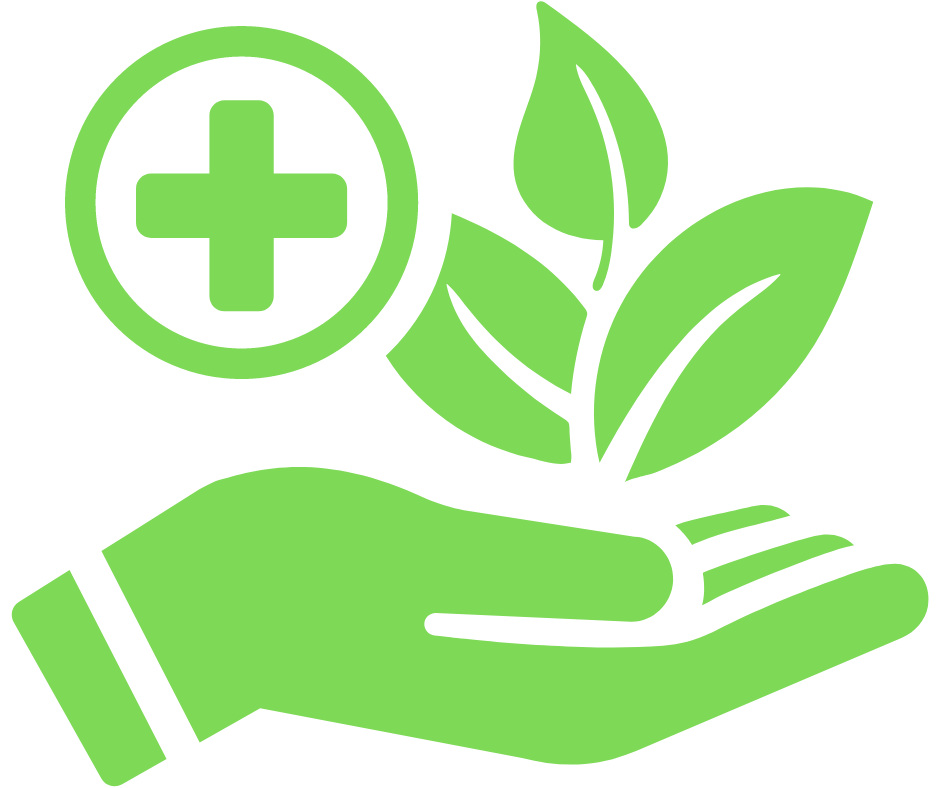
Why is Holistic medicine your best option for healing Acne?
Acne (also known as Acne Vulgaris) is an inflammatory skin condition caused by hair follicles plugging with oil and dead skin cells.

Acne affects 70-90% of the adolescent population in urban industrialized nations.
In rural areas, this percentage is relatively low; i.e., metropolitan populations are more affected than rural populations. (Read this blog to know the reasons in detail)
While Acne is often thought of as a problem that affects only teenagers, it is also quite common in adults. About half of all adults experience Acne at some point in their lives.
Acne is more common in males than females, and more than 20% of the affected individuals develop severe Acne, which results in scarring.
People with darker skin can have hyperpigmentation post-Acne.
Psychosocial effects of Acne

Several studies emphasize that people with Acne have low self-esteem and difficulty socializing, making friends, going to school & even finding employment.
Thus, Acne patients are more likely to have mental disorders like Anxiety, depression & suicide.
The prevalence of Acne creates a burden on not only the healthcare cost but also the psychological ailments associated with Acne, deteriorate the quality of life.
Some individuals believed that Acne had affected their personalities permanently and adversely.
Categorization of Acne

There is no universally accepted categorization of Acne; however, based on the severity, Acne can be classified into :
Mild- Comedones (Clogged hair follicles) mainly on the face with occasional inflammatory lesions.
Moderate – More inflammatory papules or pustules on the face (& on the body) than Milder Acne.
Severe – Larger pustules (painful bumps under the skin) extensively on the face, back & other body parts.
Papules are raised lesions on the skin that are smaller than 1 cm in diameter, while pustules are similar to papules but inflamed and filled with pus.
During puberty, the androgen hormones peak, making more sebum, thus resulting in more Acne breakouts.
Acne’s onset is typically associated with puberty, when sebum production increases due to the higher androgen hormone during the teenage years.
It mainly affects areas with more sebaceous glands, like the face, upper part of the chest, and back.
Signs & Symptoms of Acne
Increased sebum production on the skin
Comedones (clogged hair follicles)
Nodules
Pustules
Scarring
Pigmentation
Statistics

The Global Burden of Disease Study 2010 found that acne vulgaris (henceforth Acne) is the eighth most common skin disease, with an estimated global prevalence (for all ages) of 9.38%
The prevalence of Acne is increasing year by year.
In the US, the median expenditure per person per 7 months for acne treatments approved by the US Food and Drug Administration was $350–3,806.
An estimated 650 million people globally are affected by Acne, and the cost of acne treatments in the US exceeds $1 billion annually.
Conventional Treatments are available, but are they the right choice for you?

I have written a detailed blog about this topic; check it out.
Many conventional (western/allopathic) treatments exist for treating acne vulgaris, including
- Benzoyl peroxide,
- Retinoids
- Isotretinoin
- Alpha hydroxy acids
- Azelaic acid
- Salicylic acid
- Hormonal
- Antiandrogen
- Antiseborrheic treatments
However, none of these methods is free of side effects, and their exact role in therapy still needs to be determined.
For example:
Common side effects of combined oral contraceptives are weight gain, breast tenderness, and nausea. These drugs are also associated with an increased risk of cardiovascular problems, breast cancer, and cervical cancer.
Potential side effects of oral isotretinoin include inflammatory bowel disease, depression, and severe congenital disabilities.
Oral antibiotics should be used for the shortest time possible to prevent antibiotic resistance. And they should be combined with other drugs, such as benzoyl peroxide, to reduce the risk of developing antibiotic resistance.
What is Holistic medicine?

Holistic medicine focuses on treating a person as a whole (whole – istic), understanding the symptoms, and then treating the root cause holistically rather than suppressing them.
The human body has an immense capability to treat itself, and we need to support it with the help of holistic medicines.
The concept is not to treat the disease but to understand the symptoms and treat the individual as a whole.
For example, if a person has Acne, then Acne is the symptom of some internal issue in the body.
So, we don’t need to suppress or hide Acne; instead, we understand why Acne is happening in the first place because of diet, lifestyle, or something else — treating the maintaining cause & then providing the natural remedies to cleanse the body from within so the symptoms of Acne will heal eventually.
The tendency of the illness, like the tendency of a person to develop Acne, will also reduce with time with the help of holistic medicine.
What is the holistic cure for Acne?

Like any chronic health issue, Treating Acne effectively often requires a combination of approaches.
Here are some common components of a holistic acne treatment plan which I consider for treating my patients dealing with Acne:
1: Homeopathic & Herbal Remedies
Some incredible medicinal plants help combat inflammation because of their antibacterial & fungal properties.
Therefore such herbs can help treat Acne and other infective diseases. Some examples include:
Calendula
Calendula, or Calendula officinalis, is a plant traditionally used for medicinal purposes, including treating Acne.
Calendula has anti-inflammatory and wound-healing properties, which may make it effective in reducing the redness and inflammation associated with Acne. Some people use calendula oil or extract made from the plant to treat Acne, which is also sometimes used with other natural remedies, such as tea tree oil.
Ledum palustre is a plant used in traditional medicine for various purposes, including Acne treatment.
In homeopathy, a system of medicine that uses diluted potentized substances to stimulate the body’s healing processes, Ledum palustre is used to treat various skin conditions, including Acne.
Ledum Palustre works by helping to reduce inflammation and promote the healing of the skin.
Kali Bromatum – Also known as potassium bromide, is a chemical compound used in homeopathy to treat various skin conditions, including Acne.
Kali bromatum works by helping to reduce inflammation and promote the healing of the skin.
Homeopathic 30c & 200c work well for treating Acne Symptoms.
Antim Crudum – aka Antimonium crudum in homeopathic form can help with Acne Symptoms where the predominance of Acne is on the cheeks.
It works well for pustular Acne, where gut health is compromised.
Homeopathic 30C or 200C are often indicated.
It’s generally not recommended to self-prescribe homeopathic medications for Acne or any other health condition, as this can be risky. Homeopathic remedies are derived from natural substances stimulating the body’s natural healing processes. Working with a trained homeopath is essential to determine the suitable homeopathic treatment.
2: Skincare Try using gentle, non-irritating cleansers, avoiding harsh or fragranced skin care products, and using non-comedogenic moisturizers.
3: Diet & Hydration Evidence suggests that diet and hydration can affect Acne. Some studies have found that certain dietary factors, such as a high intake of refined carbohydrates, dairy products, and foods with a high glycemic index, may be associated with an increased risk of Acne.
In addition, a diet low in fruits, vegetables, and other sources of antioxidants may contribute to the development of Acne.
Hydration is also vital for healthy skin. Adequate hydration can help keep the skin moist and supple, which can help prevent Acne’s development. Dehydration can lead to dry, flaky skin, which can contribute to the development of Acne. Drinking plenty of water and other fluids to maintain proper hydration and support healthy skin is essential.
4: Digestive Health can affect the development of Acne.
Poor digestion can lead to the accumulation of toxins in the body, which can contribute to the development of Acne. In addition, certain digestive disorders, such as inflammatory bowel disease (IBD), and poor liver health, have been linked to an increased risk of Acne.
Some research has also suggested that a high intake of dairy products may be associated with an increased risk of Acne, although the evidence is mixed. Maintaining good digestive health through a healthy diet and lifestyle helps support healthy skin and reduce the risk of Acne.
5: Stress – Stress and Anxiety can affect the skin and contribute to the development of Acne. Stress can stimulate the production of sebum, an oily substance produced by the sebaceous glands in the skin.
An excess of sebum can block pores and lead to the development of Acne. Stress and Anxiety can also cause an increase in the production of the hormone cortisol, which can stimulate sebum production and contribute to the development of Acne.
Additionally, stress can weaken the immune system, making it more difficult for the body to fight off acne-causing bacteria. It is essential to manage stress and Anxiety to maintain healthy skin and help prevent the development of Acne.
It is important to understand that Genetics can play a role in the development of Acne. Research has shown that Acne tends to run in families, suggesting a genetic component.
If one or both of your parents had Acne, you might be more likely to develop Acne yourself. However, it is essential to note that genetics is just one factor that can contribute to the development of Acne. Other factors, such as hormone imbalances, certain medications, and specific cosmetic products, can also contribute to the development of Acne.
Acne is also more common in people with oily skin and those who live in humid environments. However, it is essential to note that anyone can develop Acne, regardless of age, gender, or other demographic factors.
Holistic treatment vs. conventional t/t for Acne

Different treatments can be appropriate for different stages of a health condition or different types of conditions.
Conventional medications, such as prescription drugs, can effectively manage acute symptoms or provide rapid relief of certain conditions. However, there may be better options for long-term use or addressing the underlying causes of disease.
Holistic or alternative treatments, such as herbs, supplements, and lifestyle changes, may be more suitable for long-term use and for addressing the root causes of a health issue.
It is true that conventional treatments, such as prescription drugs, can be effective in managing acute symptoms or providing rapid relief of certain conditions. However, it is essential to know that all medications, including prescription drugs, can have potential side effects.
On the other hand, holistic medicine therapies are natural and can be used for extended periods with no side effects.
It is always important to speak with a healthcare provider before starting any new treatment, whether a conventional medication or a holistic or alternative therapy, to ensure that it is safe and appropriate for your individual needs.
I have written this blog as on my knowledge, clinical experience, and the research data available; please do your due diligence & seek professional help if you doubt the treatment path you should follow for your Acne.
If you are keen to start your Holistic Acne treatment with me, you can do this directly via my website.
References:
https://pubmed.ncbi.nlm.nih.gov/21335995/
https://pubmed.ncbi.nlm.nih.gov/12873885/
https://www.aad.org/media/stats-numbers
https://www.yalemedicine.org/conditions/acne
https://www.medicaljournals.se/acta/content/abstract/10.2340/00015555-0231
https://jamanetwork.com/journals/jamadermatology/fullarticle/479409
https://www.ncbi.nlm.nih.gov/pmc/articles/PMC7527424/
